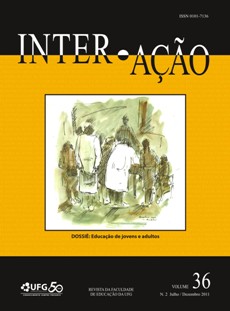THE EXPERIENCE OF POPULAR EDUCATION AT THE GOIÁS CENTER FOR POPULAR CULTURE
DOI:
https://doi.org/10.5216/ia.v36i2.16718Keywords:
Centro Popular de Cultura em Goiás, Educação de Jovens e Adultos, Educação popularAbstract
This article discusses the involvement of the Goiás Center for Popular Culture in adult education in the 1960s. This was a popular education movement, organized by the National Union of Students, engaging high school and university students, intellectuals and artists in cultural awareness activities and in adult education in the State of Goiás. The study shows how these militants in Goiás were influenced by the Recife Popular Culture Movement in terms of adult literacy, resulting in the preparation of a book entitled Leitura para Adultos (Readings for Adults). The text is based on doctoral research, including documental analysis, interviews, testimonies and reports from militants of that period.Downloads
Downloads
Published
How to Cite
Issue
Section
License
Inter-Ação uses the Creative Commons Attribution 4.0 License for Open Access Journals (Open Archives Initiative - OAI) as the basis for the transfer of rights. Open access means making documents available on the Internet free of charge, so that users can read, download, copy, distribute, print, search, or link to the full text of documents, process them for indexing, use them as input data for software programs, or use them for any other lawful purpose, without financial, legal, or technical barriers.
Authors publishing in this journal agree to the following conditions:
1) Authors retain copyright and grant the journal the right of first publication, with the work simultaneously licensed under the Creative Commons Attribution License, which permits redistribution of the work with attribution and first publication in this journal.
2) Authors are permitted to enter into additional, separate agreements for non-exclusive distribution of the version of the work published in this journal (e.g., for publication in an institutional repository or as a book chapter), with attribution and first publication in this journal.
3) Authors are permitted and encouraged to publish and distribute their work online (e.g. in institutional repositories or on their home page) at any time before or during the editorial process, as this may generate productive changes as well as increase the impact and citation of the published work.















